人教版八年级英语下册各单元语法点汇总精编版
初二英语下册知识点归纳人教版
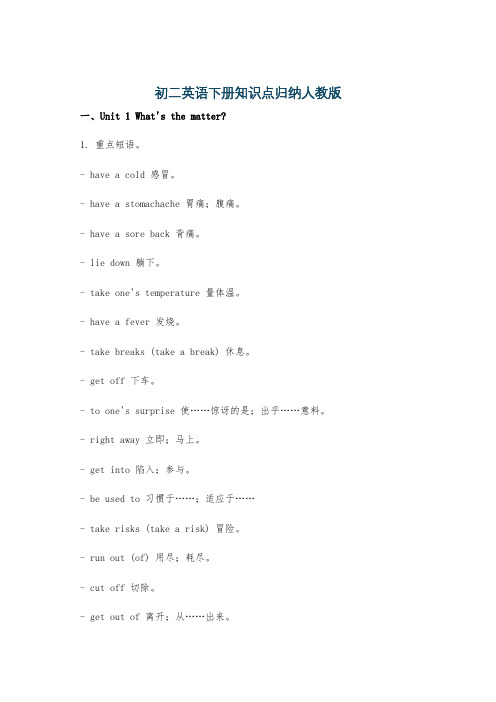
初二英语下册知识点归纳人教版一、Unit 1 What's the matter?1. 重点短语。
- have a cold 感冒。
- have a stomachache 胃痛;腹痛。
- have a sore back 背痛。
- lie down 躺下。
- take one's temperature 量体温。
- have a fever 发烧。
- take breaks (take a break) 休息。
- get off 下车。
- to one's surprise 使……惊讶的是;出乎……意料。
- right away 立即;马上。
- get into 陷入;参与。
- be used to 习惯于……;适应于……- take risks (take a risk) 冒险。
- run out (of) 用尽;耗尽。
- cut off 切除。
- get out of 离开;从……出来。
- be in control of 掌管;管理。
2. 重点句型。
- What's the matter? = What's wrong? = What's the trouble? 怎么了?- Should I put some medicine on it? 我应该在它(伤口)上敷些药吗?- You should lie down and rest. 你应该躺下休息。
- He hurt himself in P.E. class. 他在体育课上伤到了自己。
- Aron Ralston is an American man who is interested in mountain climbing. 阿伦·罗尔斯顿是一个对登山感兴趣的美国人。
3. 语法。
- 情态动词should的用法:should表示“应该”,用来提出建议或劝告,后接动词原形。
例如:You should see a dentist. 否定形式为shouldn't,例如:You shouldn't go to school late.二、Unit 2 I'll help to clean up the city parks.1. 重点短语。
人教版英语八年级下册Unit 1-5 单元语法知识梳理
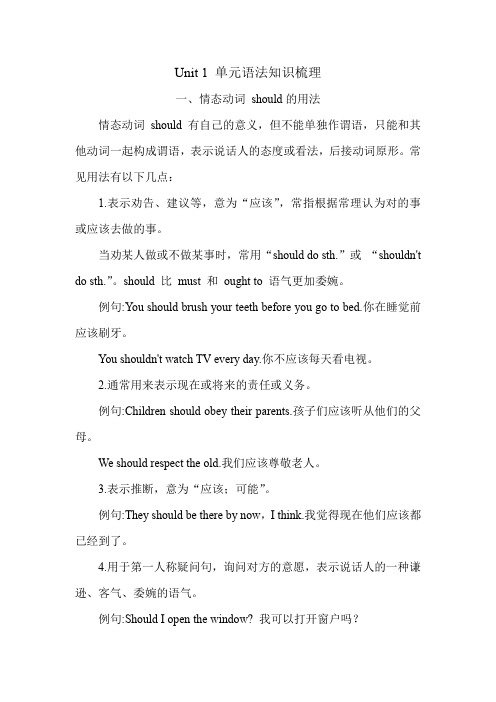
Unit 1 单元语法知识梳理一、情态动词should的用法情态动词should有自己的意义,但不能单独作谓语,只能和其他动词一起构成谓语,表示说话人的态度或看法,后接动词原形。
常见用法有以下几点:1.表示劝告、建议等,意为“应该”,常指根据常理认为对的事或应该去做的事。
当劝某人做或不做某事时,常用“should do sth.”或“shouldn't do sth.”。
should 比must 和ought to 语气更加委婉。
例句:You should brush your teeth before you go to bed.你在睡觉前应该刷牙。
You shouldn't watch TV every day.你不应该每天看电视。
2.通常用来表示现在或将来的责任或义务。
例句:Children should obey their parents.孩子们应该听从他们的父母。
We should respect the old.我们应该尊敬老人。
3.表示推断,意为“应该;可能”。
例句:They should be there by now,I think.我觉得现在他们应该都已经到了。
4.用于第一人称疑问句,询问对方的意愿,表示说话人的一种谦逊、客气、委婉的语气。
例句:Should I open the window? 我可以打开窗户吗?What should we do now? 我们现在该干什么呢?5.表示某种感情色彩,意为“竟会”,常用于以how, why开头引导的特殊疑问句中。
例句:Why should you be so early today? 你今天为什么会如此早?二、反身代词1.反身代词的构成反身代词是一种表示反射或强调的代词。
它由第一人称、第二人称的形容词性物主代词和第三人称代词的宾格加词尾-self或-selves构成。
其构成如下表:反身代词与它所指代的名词或代词形成互指关系,两者在人称和数上应保持一致。
(word完整版)人教版英语八年级下册重点词组、句型及语法点汇总,文档

英语八年级下册重点词组、句型及语法点汇总Unit 1 What ’s the matter?怎么了?一、重点词组1. have a fever / cough / cold 发热 /咳嗽 /感冒2.have a toothache / stomachache牙疼 /胃疼3.have a sore back / throat背疼 /喉咙痛4.talk too much 说得太多5.drink enough water 喝足够的水6.lie down 躺下7.drink hot tea with honey 喝加蜂蜜的热茶8.see a dentist 看牙医9.get an X-ray 拍 X 光片10.take one ’ s temperature量体温11.put some medicine on sth.在上面敷药12.all weekend 整个周末13.take breaks (=take a break)休息14.in the same way 以同样的方式15.go to a doctor=see a doctor看医生16.go along 沿着走17.shout for help 大声呼救18.without thinking twice 没有多想19.get off 下车20.have a heart problem 有意脏病21.to one ’ s surprise使惊讶的;22.expect sb to do 希望某人做某事23.wait for 等待24.agree to do 赞成做某事25.thanks to 多亏了;由于29.in time 及时30.save a/one’s life 挽救生命31.help others 帮助别人32.think about 考虑;认为33.right away 立刻;立刻34.get into trouble 造成麻烦〔或烦恼〕35.fall down 跌落36.mountain climbing 登山运动37.lose one’s life 失去生命38.(be) in a difficult situation 在困境中39.by oneself 由某人自己40.run out (of) 用完;耗尽41.cut off 切除42.climb down 爬下43.get out of 走开;从出来44.make a decision=make decisions做出决定45. be in control of掌管;管理47.take risks (take a risk) 冒险二、常有搭配1.too much 太多 1> 修饰不能数名词2> 修饰动词,表示程度too many 太多修饰可数名词复数much too 太修饰形容词或副词原级2.enough “足够的 /地〞 1> 修饰名词,常置前2> 修饰形容词或副词,常置后3.need to do 需要做某事4. without doing没有做某事5.see sb doing 看见某人正在做某事see sb do 看见某人做了某事6.24-year-old 形容词,作定语,放名词前24 years old 作表语,放 be 动词后7.be/get done 被动语态8.tell sb (not) to do sth 告诉某人〔不〕要做某事9.常有的感官动词: sound, feel, smell, look, taste 1> be 动词用法,后接形容词2> 主动表被动10.have trouble = have problems 做某事有问题=have difficulties + doing11.be interested in sth/doing 对(做)某事感兴趣12.be used to sth/doing sth 习惯于某事 /做某事used to do过去/从前做某事〔现在不〕use sth to do sth 使用去做某事13.because 后接原因状语从句because of 后接名词或 doing14.be ready to do 愿意 /准备好做某事15.so that 以便与;目的是,引导目的状语从句so that 这样以致于,引导结果状语从句16.keep on doing sth. 连续或坚持做某事17.give up doing 放弃做某事18.mind doing 介意做某事三、语法点1.咨询某人的健康问运及遇到麻烦的表达方法(1)咨询某人患了何种疾病或遇到了何种麻烦时,常用以下几种结构来表达:What’ s the matter (with sb. )?〔某人〕怎么了?What’ s wrong (with sb. )?〔某人〕怎么了? What’s the trouble (with sb.)?〔某人〕出什么事了?(2)要表达身体难过或不愉快,可用以下结构:①某人 +have/has+病症 /身体部位 +ache.②某人+have/has+a+sore+发病部位.③某人 +hurt(s)+身体部位或反身代词(oneself).④某部位 +hurt(s).⑤There is something wrong with one sb/’s+部位2.神情动词 should 的用法Should 为神情动词,意为“应该;应该〞,否认式为 shouldn ’t,此后接动词原形,无人称和数的变化。
最全面人教版八年级下册英语各单元知识点总复习归纳总结

最全面人教版八年级下册英语各单元知识点总复习归纳总结Unit 1 How often do you exercise?词汇1. frequently 经常地2. hardly 几乎不3. ever 曾经4. once in a while 时不时5. rarely 很少语法一般现在时1. 频率副词放在动词前:I always read newspapers.2. 否定句用don't或doesn't+动词原形:I don't watch TV every day.3. 疑问句用do或does+主语+动词原形:Do you play soccer every week?Unit 2 I used to be afraid of the dark.词汇1. used to 过去常常2. get over 克服3. nervous 紧张的4. confident 有信心的5. stage 舞台语法1. Be used to+动名词表示惯或适应,I am used to studying English at night.2. Used to+动词原形表示过去常常,I used to read books every day.3. Get over+名词/代词/动名词,表示克服,She got over the flu last week.Unit 3 Could you please tell me where the restaurants are?词汇1. instruction 说明2. turn right/left 向右/左转3. excuse me 对不起4. straight 直走5. opposite 对面语法1. Could you please/could/may I+动词原形,请求礼貌地做事,Could you please help me with my English?2. Would like+名词 / 动名词,表示想要做某事,I would like to go shopping with you.3. May I ask+句子,礼貌地询问某事,May I ask where the restroom is?Unit 4 Why don't you talk to your parents?词汇1. conversation 对话2. listener 听众3. honest 诚实的4. conversation starter 聊天开场白5. effective 有效的语法1. How about/What about+动名词/名词,表示建议和提议,What about watching a movie?2. Why not+动词原形,表示建议和提议,Why not go swimming?3. Let's+动词原形,表示建议和提议,Let's have a party on the weekend.Unit 5 It must belong to Carla.词汇1. sweater 毛衣2. by accident 偶然地3. honest 诚实的4. lose 丢失5. owner 拥有者语法1. Can/Can't+动词原形,表示能力或可能性,I can dance.2. Must/Mustn't+动词原形,表示肯定或否定的推断,She must be the new teacher.3. Have/Has to+动词原形,表示必须做的事情,I have to finish my homework first.词汇1. graduate 毕业生2. physics 物理学3. ambitious 有抱负的4. career 职业5. education 教育语法一般将来时1. be going to+动词原形,表示打算做某事,I am going to see a film tonight.3. be + going to+现在进行时,表示不久会发生的事情,They are going to sing a song later.Unit 7 How do you make a banana milk shake?词汇1. recipe 食谱2. whip 打(奶油)3. peel 去皮4. slice 切片5. pour 倒语法1. What/How/Which+系动词+主语+谓语,表示特定的主语或具体的内容。
人教版八年级英语下册各单元知识点总结完整版

Unit 1 What’s the matter?一、重点短语1. have a fever 发烧2. have a cough 咳嗽3. have a toothache 牙疼4. talk too much 说得太多5. drink enough water 喝足够的水6. have a cold 受凉;感冒7. have a stomachache 胃疼8. have a sore back 背疼9. have a sore throat 喉咙痛10. lie down and rest躺下来休息11. hot tea with honey加蜂蜜的热茶12. see a dentist看牙医13. get an X-ray拍X光片14. take one’ s temperature量体温15. put some medicine on sth在……上面敷药16. feel very hot 感到很热17. sound like 听起来像18. all weekend 整个周末19. in the same way以同样的方式20. go to a doctor 看医生21. go along 沿着……走22. on the side of the road 在马路边23. shout for help 大声呼救24. without thinking twice 没有多想25. get off 下车26. have a heart problem 有心脏病27. to one’ s surprise 使……惊讶的28. thanks to 多亏了;由于29. in time及时30. save a life 挽救生命31. get into trouble 造成麻烦32. right away 立刻;马上33. because of 由于34. get out of 离开35. hurt oneself 受伤36. put a bandage on sth. 用绷带包扎37. fall down 摔倒38. feel sick 感到恶心39. have a nosebleed 流鼻血40. cut his knee割伤他的膝盖41. put her head back 把她的头向后仰42.have problems breathing呼吸困难43. mountain climbing登山运动44. be used to doing sth. 习惯做某事45. run out (of) 用完;用尽46. so that 以便47. so…that 如此……以至于……48. be in control of 掌管;管理49. in a difficult situation 在逆境屮50. keep on doing sth.坚持做某事51. make a decision做出决定52. take risks 冒险53. give up 放弃二、知识点解析1. What’s the matter? 怎么了?若是询问“某人怎么了?”要用“What’s the matter with sb.?”拓展:What’s the matter with sb.? 的同义句:What’s wrong with sb.? / What’s the trouble with sb.?2.疾病类短语:have a +疾病. e.g. :have a fever 发烧have a cold 感冒have a cough 咳嗽.have a +身体部位-ache. e.g.: have a headache 头痛have a toothache 牙痛.have a sore+身体部位. e.g.: have a sore throat咽喉痛have a sore back背痛例题:Mom, I____________.I’m sorry to hear that, dear. We must go to see the dentist right away.A. have a headacheB. have a stomachacheC. have a toothacheD. have a fever3. lie down 躺下V. 躺,平躺。
(完整word版)最新人教版八年级英语下册各单元语法点汇总
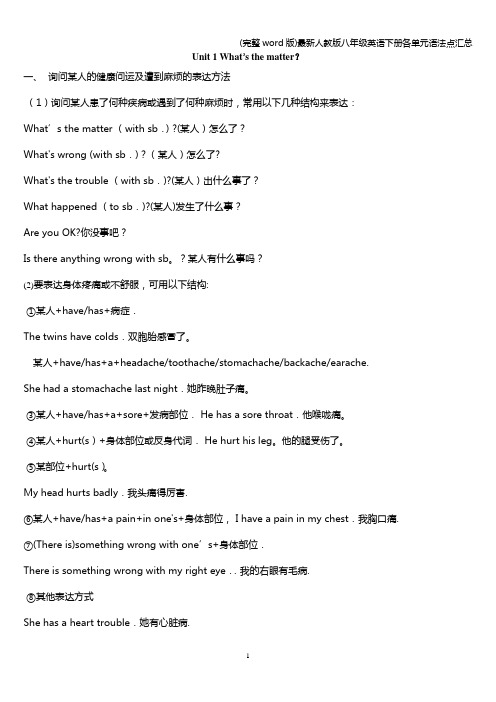
Unit 1 What’s the matter?一、询问某人的健康问运及遭到麻烦的表达方法(1)询问某人患了何种疾病或遇到了何种麻烦时,常用以下几种结构来表达:What’s the matter (with sb.)?(某人)怎么了?What's wrong (with sb.)?(某人)怎么了?What's the trouble (with sb.)?(某人)出什么事了?What happened (to sb.)?(某人)发生了什么事?Are you OK?你没事吧?Is there anything wrong with sb。
?某人有什么事吗?(2)要表达身体疼痛或不舒服,可用以下结构:①某人+have/has+病症.The twins have colds.双胞胎感冒了。
某人+have/has+a+headache/toothache/stomachache/backache/earache.She had a stomachache last night.她昨晚肚子痛。
③某人+have/has+a+sore+发病部位. He has a sore throat.他喉咙痛。
④某人+hurt(s)+身体部位或反身代词. He hurt his leg。
他的腿受伤了。
⑤某部位+hurt(s)。
My head hurts badly.我头痛得厉害.⑥某人+have/has+a pain+in one's+身体部位, I have a pain in my chest.我胸口痛.⑦(There is)something wrong with one’s+身体部位.There is something wrong with my right eye..我的右眼有毛病.⑧其他表达方式She has a heart trouble.她有心脏病.He got hit on the head他头部受到了撞击。
八年级下册英语各单元重点短语+句型语法 人教版

八年级下册英语各单元重点短语+句型语法人教版1. Unit 1Important phrases:- get to know: I want to get to know my new classmates.- make friends with: I hope to make friends with some local students.- be interested in: She is interested in learning a new language.- take part in: Are you going to take part in the school talent show?- show off: Don't show off in front of your friends.- be proud of: I am proud of my brother for winning the race.Sentence patterns and grammar:- Present continuous tense: He is playing football in the park.- Comparative adjectives: My sister is taller than me.- Superlative adjectives: This is the best pizza I've ever tasted.2. Unit 2Important phrases:- turn off: Don't forget to turn off the lights before you leave.- set off: We will set off for the beach early in the morning.- look forward to: I am looking forward to the schooltrip next week.- get along with: I get along with my classmates very well.- break down: Our car broke down on the way to the airport.- run out of: We ran out of milk, so I need to go to the store.Sentence patterns and grammar:- Past continuous tense: They were playing basketball when the rain started.- Modal verbs: You should study harder for the exam.- Reported speech: She said that she was going to the movies.3. Unit 3Important phrases:- be strict with: My teacher is very strict with homework deadlines.- get into: She wants to get into a good university.- take care of: Don't forget to take care of your little brother.- be good at: I am good at playing the piano.- look up to: I look up to my older sister as a role model.- come up with: We need to come up with a plan for the project.Sentence patterns and grammar:- Future perfect tense: By next year, I will havefinished high school.- Present perfect continuous tense: She has been studying English for five years.- Conditional sentences: If I had known, I would have helped you.4. Unit 4Important phrases:- call for: This situation calls for a serious discussion.- hold on: Please hold on while I transfer your call.- look out: Look out for the car coming down the road.- put off: Don't put off until tomorrow what you can do today.- try out: I want to try out for the school basketball team.- fall apart: Our friendship fell apart after the argument.Sentence patterns and grammar:- Present perfect tense: I have finished my homework.- Past perfect tense: She had already left when I arrived.- Passive voice: The cake was made by my mom.5. Unit 5Important phrases:- set up: We need to set up the equipment for the presentation.- take off: The plane will take off in an hour.- go through: I will go through my notes before the exam.- look into: The police will look into the matter.- pick up: Can you pick up some milk on your way home?- be satisfied with: I am satisfied with my test results.Sentence patterns and grammar:- Future continuous tense: They will be having dinner at7 PM.- Reported questions: He asked her where she was goingfor the holidays.- Relative clauses: The boy who won the race is my friend.6. Unit 6Important phrases:- be proud of: She is proud of her achievements.- look after: My sister looks after our pet dog.- give up: Don't give up on your dreams.- make a decision: I need to make a decision about which college to attend.- put up with: I can't put up with his behavior any longer.- take after: My son takes after his father in terms of looks.Sentence patterns and grammar:- Past perfect continuous tense: She had been studying all night when her parents arrived.- Reported commands: He told her to clean her room.- Adverb clauses: I will call you when I get home.。
人教版八年级下册各单元英语语法解析知识重点总结
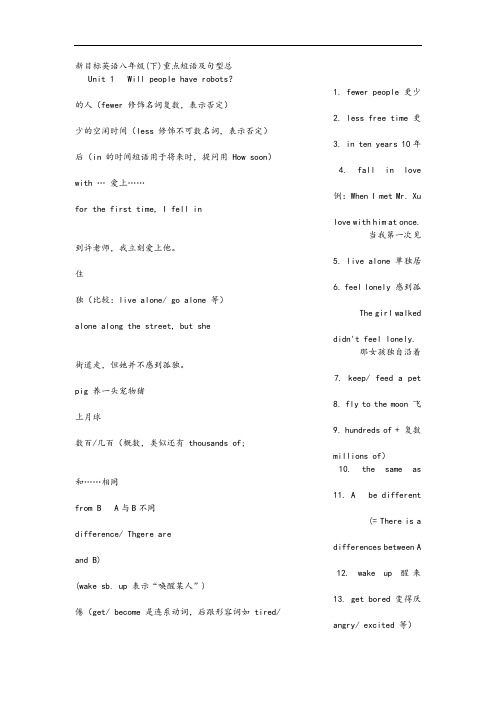
新目标英语八年级(下)重点短语及句型总Unit 1 Will people have robots?1. fewer people 更少的人(fewer 修饰名词复数,表示否定)2. less free time 更少的空闲时间(less 修饰不可数名词,表示否定)3. in ten years 10年后(in 的时间短语用于将来时,提问用 How soon)4. fall in love with … 爱上……例:When I met Mr. Xu for the first time, I fell inlove with him at once.当我第一次见到许老师,我立刻爱上他。
5. live alone 单独居住6. feel lonely 感到孤独(比较:live alone/ go alone 等)The girl walked alone along the street, but shedidn't feel lonely.那女孩独自沿着街道走,但她并不感到孤独。
7. keep/ feed a pet pig 养一头宠物猪8. fly to the moon 飞上月球9. hundreds of + 复数数百/几百(概数,类似还有 thousands of;millions of)10. the same as 和……相同11. A be different from B A与B不同(= There is a difference/ Thgere aredifferences between A and B)12. wake up 醒来(wake sb. up 表示“唤醒某人”)13. get bored 变得厌倦(get/ become 是连系动词,后跟形容词如 tired/angry/ excited 等)14. go skating 去滑冰(类似还有 go hiking/ fishing /skating/ bike riding 等)15. lots of/ a lot of 许多(修饰可数名词、不可数名词都可以)16. at the weekends 在周末17. study at home on computers 在家通过电脑学习18. agree with sb. 同意某人(的意见)19. I don't agree. = I disagree. 我不同意。
人教版初中英语八年级下册全册各单元知识点、语法归纳整理
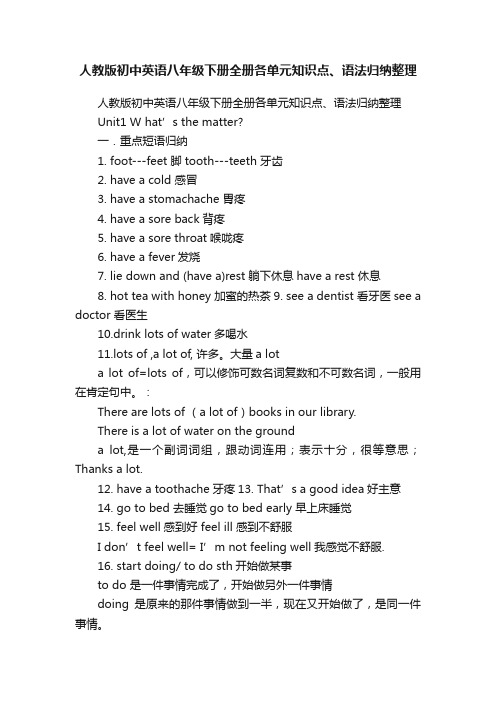
人教版初中英语八年级下册全册各单元知识点、语法归纳整理人教版初中英语八年级下册全册各单元知识点、语法归纳整理Unit1 W hat’s the matter?一.重点短语归纳1. foot---feet 脚tooth---teeth 牙齿2. have a cold 感冒3. have a stomachache 胃疼4. have a sore back背疼5. have a sore throat喉咙疼6. have a fever发烧7. lie down and (have a)rest 躺下休息have a rest 休息8. hot tea with honey 加蜜的热茶9. see a dentist 看牙医see a doctor 看医生10.drink lots of water多喝水11.lots of ,a lot of, 许多。
大量a lota lot of=lots of,可以修饰可数名词复数和不可数名词,一般用在肯定句中。
:There are lots of (a lot of)books in our library.There is a lot of water on the grounda lot,是一个副词词组,跟动词连用;表示十分,很等意思;Thanks a lot.12. have a toothache牙疼13. That’s a good idea好主意14. go to bed 去睡觉go to bed early 早上床睡觉15. feel well感到好 feel ill 感到不舒服I don’t feel well= I’m not feeling well我感觉不舒服.16. start doing/ to do sth开始做某事to do 是一件事情完成了,开始做另外一件事情doing是原来的那件事情做到一半,现在又开始做了,是同一件事情。
人教版八年级英语下册单元知识点总结及语法汇总
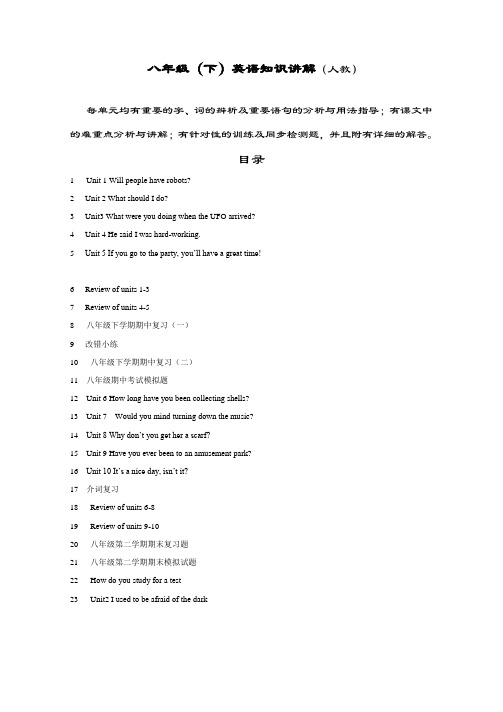
八年级(下)英语知识讲解(人教)每单元均有重要的字、词的辨析及重要语句的分析与用法指导;有课文中的难重点分析与讲解;有针对性的训练及同步检测题,并且附有详细的解答。
目录1 Unit 1 Will people have robots?2 Unit 2 What should I do?3 Unit3 What were you doing when the UFO arrived?4 Unit 4 He said I was hard-working.5 Unit 5 If you go to the party, you’ll have a great time!6 Review of units 1-37 Review of units 4-58 八年级下学期期中复习(一)9 改错小练10 八年级下学期期中复习(二)11 八年级期中考试模拟题12 Unit 6 How long have you been collecting shells?13 Unit 7Would you mind turning down the music?14 Unit 8 Why don’t you get her a scarf?15 Unit 9 Have you ever been to an amusement park?16 Unit 10 It’s a nice day, isn’t it?17 介词复习18 Review of units 6-819 Review of units 9-1020 八年级第二学期期末复习题21 八年级第二学期期末模拟试题22 How do you study for a test23 Unit2 I used to be afraid of the darkUnit 1Will people have robots?II. Grammar:·一般将来时·there will be ·few,a few,little,a little,much,many语法小结:一、一般将来时1.用be doing表示将来:主要意义是表示按计划、安排即将发生的动作,常用于位置转移的动词。
人教版八年级下册英语重点词汇,短语,句型,语法总结

Unit 1 will people have robots?一、重点词汇:probably;able;interview;company;shape;impossible.二、重点短语:1. be scared of sb./sth. 恐惧某人/某物2. go up 上升,与rise 同义,与go down 或set 相反3. make a noise 发出声响,吵闹4. arrive in 到达,表示到达某一城市、国家等大地方时,用介词in;表示到达某一村庄、车站等小地方时,用介词at ;到达的地方用副词表示时,可不用介词。
5. not…until…直到……才……6. see…doing…停止做某事7. go cycling 相当于go to ride a bike ,意思是去骑车。
8. nit sb. on the head 表示“打某人的头”,表示的“打某人的脸”要用hit sb. in the face 。
9. turn around 转身10. fall off 摔下来11. give sb. a push 推某人一下12. help sb. do sth. = help sb. with sth. 帮助某人做某事13. get off 从……下来,通常指下火车、巴士、轮船、飞机等。
14. think about 思考、想起、想到(某人或某事)15. all day 一整天16. one by one 一个接一个地,类似有year by year 一年又一年;day by day 一天又一天。
17. hold on 有两个意思,一个是“(电话)不挂断”;一个是“抓紧”。
18. come down 下来三、重难点解析:1.比较级:less 最高级least2.agree:1) 表示“同意某人意见”时用agree with sb,该短语不能用于被动语态。
2) 表示“同意(某计划、办法、建议、条件)”时,用agree to(to在此用作介词,其后接名词、代词或者相当于名词的成分),该短语可以用于被动语态。
(完整word版)人教版八年级下册英语语法解析总结,推荐文档

新目标Unit 1 Will people have robots?(下本单元语法讲解:一般将来时)1.表示将要发生的动作或存在的状态。
本时态标志词重点①含tomorrow; next 短语;② in + 段时间;③ how soon ;语法④by + 将来时间;⑤y the time sb. do ;?⑥ 祈使句句型中:or/结and sb. will do ;⑦ 在时间/条件状语从句中,如果从句用一般现在时,主句用将来时;Mother day比较fe going to 与will:be going to 表示近期、眼下就要发生的事情,will表示的将来时间则较远一些。
女口:He is going to write a letter toni ght. He willwrite a book one day.2. be goi ng to 表示根据主观判断将来肯定发生的事情,will表示客观上将来势必发生的事情。
He is seriously ill. He is going to die. Hewill be twenty years old.3. be going to 含有计划,备”的意思,而will则没有这个意思,如:She is going to lend us her book. He will behere in half an hour.4. 在有条件从句的主句中,一般不用be going to, 而多用will。
如:If any beasts comes at you, I'll stay with you and help you.掌握了它们的这些不同,你就能很好的区分be going to 与will 了。
一般将来时常见的标志词①含tomorrow; next 短语;②in + 段时间;③ how soon ;④ by + 将来时间;5. 祈使句句型中:or/a nd sb. will do例: Be quick, or you will be late = If you don't be quick, you will be late6. 在时间/条件状语从句中,如果从句用一般现在时,主句用将来时Unit 2 What should I do?本单元目标句型:1. What's wrong (with you)?/ What's the matter?2. What should I do? 我该怎么办3. You could write him a letter. 你可以给他写圭寸信。
人教版八年级下册英语期末复习:各单元重要语法知识点总结(实用!)

人教版八年级下册英语期末复习: 各单元重要语法知识点总结Unit 11.th.+ad.表示一类人, th.+姓氏复数形式, 表示夫妇两人或一家人, 谓语动词用复数2.hav.difficulty/troubl./problem.i.doin.st.“做某事有困难”,doing前的in可以省略。
3.动词不定式用法①动词不定式作宾语。
v+ to do sth 常见的动词有: want, decide, hope, plan,would like ,等, 表示还没有做的动作。
②动调不定式作状语。
表示行为、目的、结果。
句子+to do sth 或To do sth , + 句子③动词不定式作宾语补足语。
v+s..t.d.sth.常用动词有: as..wan..tell.wis.H.tol.me(mot).today、他叫我今天④表示感觉的动词, 如see,hear,notice,feel 等, 以及使役动词let, have,make等后常用省略to的动词作宾语补足语。
l see him leave.我看见他离开了。
⑤做主语。
做主语时常和It’s+ adj + for + sb + to do sth 转换, it's是形式主语, 动词不定式是真实主语⑥做定语。
a house to live in 住的房间paper to write on 写的纸。
此时的动词不定式与所修饰的名词构成动宾或逻辑关系。
4.happen的用法①sth.happene.t.s.某人出了某事(常指不好的事. eg:Wha.happene.t.you?你怎么啦?②sb.happen(s)to do sth.某人碰巧做某事eg: I happened to meet a friend of mine in the street yesterday.③辨析happen / take place happen是突然发生, 偶然发生的事, take place是按计划, 安排发生的事。
人教版八年级英语下册全册知识点考点整理

八年级英语下册全册各单元知识点考点整理Unit 1 what's the matter?一、重点短语1.too much太多2.lie down躺下3.get an X-ray做个X光检查4.take one’s temperature量体温5.put some medicine on......在....上敷药6.have a fever发烧7.take breaks/take a break休息8.without thinking twice没多想9.get off下车10.take sb to the hospital送某人去医院11.wait for等待12.to one’s surprise使.......惊讶的13.thanks to多亏于;由于14.in time及时15.think about考虑16.have a heart problem患有心脏病17.get into the trouble遇到麻烦18.do the right thing做正确的事情事情19.fall down摔倒20.put......on sth把...放在某物上21.get hit/sunburned摔伤/烧伤22.be interested in对.....感兴趣23.be used to习惯于....24.take risks/take a risk挑战25.lose one’s life失去生命26.because of因为27.run out of用完28.cut off切除29.get out of从...出来30.make a decision/decisions做决定31.be in control of掌管;管理32.give up放弃主要句型1.It’s+形容词+for sb.+to do sth.做某事对某人来说是…的。
It’s important to do sth.做某事很重要。
(完整版)人教版部编版八年级下册英语第三单元复习知识点梳理

(完整版)人教版部编版八年级下册英语第三单元复习知识点梳理
1. 语法知识点
- 一般现在时:表示经常性动作或现在的状态
- 一般过去时:表示过去发生或存在的动作或状态
- 现在进行时:表示现在正在进行的动作
- 过去进行时:表示过去某一时刻正在进行的动作
- 现在完成时:表示过去某一时刻发生的动作对现在产生的影响
- 过去完成时:表示过去某一时刻之前已完成的动作
2. 词汇知识点
- 动词的不定式
- 预先研究一些常见的动词短语
- 研究动词的过去分词形式
- 研究一些常见的形容词和副词
3. 句型知识点
- 肯定句:主语 + 动词 + 其他成分
- 否定句:主语 + 动词 + not + 其他成分
- 一般疑问句:助动词/系动词 + 主语 + 动词 + 其他成分?
- 特殊疑问句:疑问词 + 一般疑问句
4. 对话和情景交际
研究并熟悉课本中的对话和情景交际,理解对话中的语言表达和交流。
5. 阅读理解
通过阅读短文,理解文章大意,研究并掌握一些常见的词汇和表达方式。
6. 写作技巧
- 研究常用句式和表达方式
- 练写一些简短的句子和段落
- 注意语法和拼写错误的纠正
以上是人教版部编版八年级下册英语第三单元的复知识点梳理,希望对你的研究有所帮助。
*注意:此文档梳理的内容来源于人教版部编版八年级下册英
语教材,仅供参考学习使用。
*。
人教版八年级英语下册语法归纳

八年级下册重点语法和短语Unit 1 Will people have robots?重点语法:一般将来时态的应用do/does 的一般将来时态形式:(shall/will) dodo/does 的一般将来时态的被动语态:(shall/will) be done一般将来时态的肯定句、否定句、疑问句形式:肯定句例句:People will have robots in a few years.否定句例句:People (will not/won't) have robots in a few years.一般疑问句例句:Will people have robots in a few years?特殊疑问句例句:What will people have in a few years?重点短语:won't = will notthey'll = they willshe'll = she willhe'll = he willI'll = I willfall in love with(sb./sth.) 爱上(某人/某物)be able to do sth. 能够做某事come true 实现in the future 未来hundreds of 数以百计的thousands of 数以千计的look for(sb./sth.) 寻找(某人/某物)will → would 情态动词will 的原形和过去式may → might 情态动词may 的原形和过去式Reading Strategy(阅读方法)Look at the title and picture, and predict what you will read about. (看着标题和图片,预知你要阅读那些方面的内容。
)This helps you get ready to acquire new information. (这样可以帮助你获得一些新的信息。
人教版八年级下册英语期末复习:Unit 1-Unit 10 各单元重点语法知识点汇编(全面!)

人教版八年级下册英语期末复习:Unit 1-Unit 10各单元重点语法知识点汇编Unti1 what’s the matter?一、四会单词Matter, stomachache, foo, neck, stomach,throat, fever, toothache , headache, break, passenger,trouble, knee, nosebleed, climber, accident,situation, blood, importance, decision, spirit,death, nurse,lie, hurt,hit,press,breathe,mean,herself,ourselves,sore,sick, sunburned,cough, bandage, risk , control二、重点词组与句子1.too much 太多2.lie down 躺下3.get an X-ray 做个X光检查4.take one ’s temperature 量体温5.put some medicine on ......在....上敷药6.have a fever 发烧7.take breaks /take a break 休息8.without thinking twice 没多想9.get off 下车10.take sb to the hospital 送某人去医院11.wait for等待12.to one’s surprise 使.......惊讶的13.thanks to多亏于;由于14.in time及时15.think about 考虑16.have a heart problem患有心脏病17.get into the trouble 遇到麻烦18.do the right thing做正确的事情事情19.fall down 摔倒20.put ...... on sth把...放在某物上21.get hit/sunburned 摔伤/烧伤22.be interested in 对.....感兴趣23.be used to 习惯于.... 24.take risks/take a risk 挑战25.lose one’s life 失去生命26.because of 因为27.run out of 用完28.cut off 切除29.get out of 从...出来30.make a decision/decisions 做决定31.be in control of 掌管;管理32.give up 放弃重点句子:1.She talked about too much and didn’t drink enough water.She has a very sore throat.2.You need to take breaks away from the computer.3.I think I sat in the same way for too long without moving.4.The driver saw an old man lying on the side of the road,a woman next to him was shouting for help.5.He expected most of or all of the passengers to get off and wait for the next bus.6.Thanks to him and the passengers,the mas was saved by doctors in time.7.It’s sad that many people don’t want to help others because they don’t want any trouble.8.The driver didn’t think about himself,he only thought about saving a life.9.There were many times when Aron almost lost his life because of accidents.10.Because he could not free his arm,he stayed there for five days and hoped that someone would find him.11.When his water ran out,he knew that he would have to do something to save his own life.12.Let’s think about it before we find ourselves “between a rock and a hard place”,and before we have to make a decision that could mean life or death.重点搭配:1.need to do sth .需要去做某事2.see sb doing sth 看见某人正在做某事3.ask sb sth 询问某人某事4.expect sb to do sth 期望某人做某事5.agree to do sth 同意做某事6.help sb (to) do sth 帮助某人做某事7.want to do sth 想要做某事8.tell sb to do sth 告诉某人做某事9.have problems(in) doing sth 做某事有困难e sth to do sth用某物去做某事11.be/get used to doing sth 习惯于做某事12.seem to do sth 好像做某事13.keep on doing sth 继续做某事14.mind doing sth 介意做某事语法点1.询问某人的健康问题及遇到麻烦的表达方法2.情态动词should的用法3.不定代词的用法精细解读1. What’s the matter (with you)? 怎么了?出什么事了?What’s the trouble/ the problem / wrong with sb./ sth.?2. I had a cold.我感冒了。
人教版八年级下册各单元英语语法解析知识重点总结
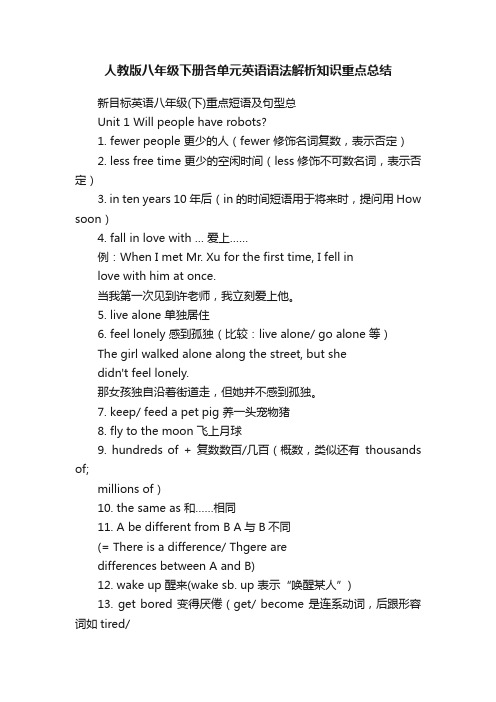
人教版八年级下册各单元英语语法解析知识重点总结新目标英语八年级(下)重点短语及句型总Unit 1 Will people have robots?1. fewer people 更少的人(fewer 修饰名词复数,表示否定)2. less free time 更少的空闲时间(less 修饰不可数名词,表示否定)3. in ten years 10年后(in 的时间短语用于将来时,提问用How soon)4. fall in love with … 爱上……例:When I met Mr. Xu for the first time, I fell inlove with him at once.当我第一次见到许老师,我立刻爱上他。
5. live alone 单独居住6. feel lonely 感到孤独(比较:live alone/ go alone 等)The girl walked alone along the street, but shedidn't feel lonely.那女孩独自沿着街道走,但她并不感到孤独。
7. keep/ feed a pet pig 养一头宠物猪8. fly to the moon 飞上月球9. hundreds of + 复数数百/几百(概数,类似还有thousands of;millions of)10. the same as 和……相同11. A be different from B A与B不同(= There is a difference/ Thgere aredifferences between A and B)12. wake up 醒来(wake sb. up 表示“唤醒某人”)13. get bored 变得厌倦(get/ become 是连系动词,后跟形容词如tired/angry/ excited 等)14. go skating 去滑冰(类似还有go hiking/ fishing /skating/ bike riding 等)15. lots of/ a lot of 许多(修饰可数名词、不可数名词都可以)16. at the weekends 在周末17. study at home on computers 在家通过电脑学习18. agree with sb. 同意某人(的意见)19. I don't agree. = I disagree. 我不同意。
- 1、下载文档前请自行甄别文档内容的完整性,平台不提供额外的编辑、内容补充、找答案等附加服务。
- 2、"仅部分预览"的文档,不可在线预览部分如存在完整性等问题,可反馈申请退款(可完整预览的文档不适用该条件!)。
- 3、如文档侵犯您的权益,请联系客服反馈,我们会尽快为您处理(人工客服工作时间:9:00-18:30)。
人教版八年级英语下册各单元语法点汇总精编版本页仅作为文档页封面,使用时可以删除This document is for reference only-rar21year.MarchUnit 1 What’s the matter?一、询问某人的健康问运及遭到麻烦的表达方法(1)询问某人患了何种疾病或遇到了何种麻烦时,常用以下几种结构来表达:What’s the matter (with sb.)(某人)怎么了What’s wrong (with sb.)(某人)怎么了What’s the trouble (with sb.)(某人)出什么事了What happened (to sb.)(某人)发生了什么事Are you OK你没事吧Is there anything wrong with sb.某人有什么事吗(2)要表达身体疼痛或不舒服,可用以下结构:①某人+have/has+病症.The twins have colds.双胞胎感冒了。
某人+have/has+a+headache/toothache/stomachache/backache/earache.She had a stomachache last night.她昨晚肚子痛。
③某人+have/has+a+sore+发病部位. He has a sore throat.他喉咙痛。
④某人+hurt(s)+身体部位或反身代词. He hurt his leg.他的腿受伤了。
⑤某部位+hurt(s).My head hurts badly.我头痛得厉害。
⑥某人+have/has+a pain+in one’s+身体部位, I have a pain in my chest.我胸口痛。
⑦(There is)something wrong with one’s+身体部位.There is something wrong with my right eye..我的右眼有毛病。
⑧其他表达方式She has a heart trouble.她有心脏病。
He got hit on the head他头部受到了撞击。
She cut her finger.她割破手指了。
二情态动词should的用法1.Should为情态动词,意为“应该;应当”,否定式为shouldn’t,其后接动词原形,无人称和数的变化。
常用来表示征询意见、建议、劝告、要求或义务等。
You should drink hot water with honey.你应该喝加有蜂蜜的开水。
He should put his head back他应该把头后仰。
We should try our best to help him.我们应当尽力去帮助他。
You shouldn‘t watch TV.你不应该看电视。
2.Should用于主语为第一人称的疑问句,表示征询意见。
Should I put some medicine on it我应当给它敷上药吗 Should we tell her about it我们应该告诉她这件事吗【拓展】在英语中,表示建议的说法有很多,而且都是中考考查的重点。
主要结构有:①Would you like (to do) sth.你想要/愿意(做)某事吗Would you like to play basketball with me你想要和我一起打篮球吗②Shall I/we do sth 我/我们做……好吗?Shall we go to the zoo tomorrow明天我们去动物园,好吗③Why not do sth 为什么不……呢?Why not join us为什么不加入到我们当中来呢④How/What about doing sth 做某事怎么样 How about going swimming去游泳怎么样⑤Let’s do sth让我们做……吧。
Let’s go home.咱们回家吧。
⑥You’d better (not) do sth你最好(不)要做某事。
You’d better not go there alone.你最好不要一个人去那儿。
Unit 2 I'll help clean up the city parks动词不定式A. 作主语——为避免句子的头重脚轻,常用it作为形式主语,而真正的主语动词不定式后置。
常用句型:It +be+adj./n.+(for/of sb.) to do sth./It takes sb. some time to do sth.B. 作宾语——动词want, decide, hope, ask, agree, choose, learn, plan, need, teach, prepare…常接动词不定式作宾语。
C. 作(后置)定语——常用于“have/has+sth.+to do”或“enough+名+to do”“It’s time to do sth.”等结构中。
D. 作宾语补足语——tell, ask, want, invite, teach, like, call等可接带to的动词不定式作宾语补足语,构成tell/ask/want /call/invite sb. to do sth.结构。
【注意】动词不定式作使役动词和感官动词的宾语补足语时应省去to:“一感(feel),二听(listen to, hear),三让(let, make, have,,四看(look at, see, watch, notice),半帮助(help)”。
E. 动词不定式作状语主要用来修饰动词,表示目的,结果或原因。
为了强调目的,有时可以把动词不定式放在句首,或在不定式前加in order (to) 或so as (to) “为了,目的是”。
常用结构有too + adj./adv. + to do sth.等。
F. 固定句式中动词不定式的用法常见的形式有:had better (not) do sth./Would you like to do sth./Why not do sth./Would you please (not) do sth.等。
Unit 3 Could you please clean your roomCould you please...句型(1)请求别人时通常用此句型,也可以说:Can you...please?情态动词could或can在这里均表示请求,在意思上无区别,但是用could在于其上显得更委婉、客气、诚恳。
在日常生活中常使用could you/I...若在句末加上please,则显得更礼貌。
Could you help me find my book,please你能帮我找到我的书吗(2)对could you/I...(3)的问句作出肯定回答,常用“sure/certainly/of course”等;如果作否定回答,常用“sorry或oh,please don’t”。
一般不用no开头,用no显得语气生硬、不礼貌。
(4)表示请求的句式:Would you like to do...Would you mind doing...Let’s do.... Shall I/we do...Please do...(祈使句前加please)提示:could you please...与could I Please...两种问句,前者是请求别人帮忙的句式,后者是有礼貌地向别人请求允许的交际用语。
试比较:Could you please help me请你帮我一下好吗Could I please invite my friends to my birthday party,Mom? 妈妈,我能邀请我的朋友参加我的生日聚会吗?Unit 4 Why don't you talk to your parents?1.提建议向别人发出邀请,请求,建议,或征求某人的意见的其他表达方式:How /what about doing sth.2.(about是个介词,可跟名词或动名词)“…怎么样?”You’d better (not) do something.“你最好(不)做某事”Would you like sth …:“你想要某物Let‟s do sth…What should I do … ( should表示请求、征询对方意见)2.学会谈论问题和学会用why don't you…提建议向别人发出邀请,请求,建议,或征求某人的意见的表达方式:Why don‟t you do something? =Why not do something? 你为什么不做某事呢?来表示请求、征询对方意见3.until, so that ,although引导的状语从句:1)until:在带有till或until引导的时间状语从句里,如果主句用肯定式,其含义是“一直到……时”,谓语动词只能用延续性动词。
如果主句用否定式,其含义是“直到……才……”, “在……以前不……”, 谓语动词可用瞬间动词。
Don‟t get off until the bus stops.2)so that引导目的状语从句(为了,以便)例如:He studies hard so that he could work better in the future3)although的用法意思相当于though(尽管,虽然),引导让步状语从句。
引导的从句不能与并列连词but,and, so等连用,但可以和yet, still等词连用。
例如:Although he was tired, he went on working.尽管他很累,但是他继续工作。
Unit 5 What were you doing when the rainstorm came?过去进行时1. 基本概念:过去进行时表示在过去某一时刻或一段时间内正在进行的动作。
这一特定的过去时间除有上下文暗示以外, 一般用时间状语来表示。
2. 结构 was / were ( not ) + 动词-ing3. 句式肯定式:I/He/She/It was working. We/You/They/ were working.否定式:I/He/She/It was not working.We/You/They/ were not working.疑问式和简略回答:Was I working? Yes, you were. No, you were not. Were you working? Yes, I was. No, I was not. Was he/she /it working? Yes, he/she/it was. No, he/she/it was not. Were we/you/they working? Yes, you/we/they were. No, you/we/they were not. 注:1) was not常缩略为wasn’t; were not常缩略为weren’t。
